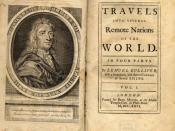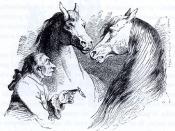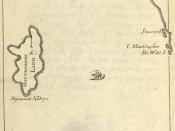Throughout the beginning of the 18th century, satire grew; and the most famous writers who wrote satirically were Pope and Swift. This time period, often called the "Age of Reason," was highly influenced by a group of the elite of society, who called themselves the Enlightenment Philosophers and were determined to live their lives according to "truth" and "reason." The satire of Swift is shown with moral issues and heightened by a tragic sense of doom. Jonathan Swift's greatest work was a series of chronicled voyages known as Gulliver's Travels. "Gulliver's Travels" was published in 1726, and can be read as a fantasy novel, a story for children, and a social satire, its tales of dwarves, giants, floating islands and talking horses, which have long entertained readers from every age group. It has often been issued with long passages omitted, particularly those concerning bodily functions and other distasteful topics. Even without these passages, however, Gulliver's Travels serves as a biting satire, and Swift wrote it to be both humorous and critical, constantly criticizing British and European society through its descriptions of imaginary countries.
The fourth book of Gulliver's Travels, "A Voyage to the Houyhnhnms," is particularly filled with satire, as Gulliver discovers a Utopian society of horses (Houyhnhnms) who sneer at humans (Yahoos) as being savage. The Houyhnhnms enslave the Yahoos, and use them as forced labour. The Houyhnhnms are supposedly perfect and Yahoos to them are evil. There can be little doubt that the major purpose of the Fourth Voyage is to reveal the barbarism of humanity. "The theme is found nearly everywhere. The reader cannot help but feel in part ashamed of himself after finishing the book. Swift here is writing almost an allegory on the constituent elements in man: he is splitting...


